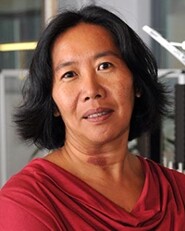

The infection rate is rising again in the Netherlands, which means it may also be rising among Leiden University’s students and staff. How is the University responding? And what dilemmas is it facing? We spoke to our Rector Magnificus, Chief Security Officer and two other administrators.


Leo Harskamp (Chief Security Officer) on notifying the University of an infection
‘There has recently been a marked increase in the number of infections in Leiden and The Hague. Although many students and staff are following the guidelines, some groups are not observing the distancing rules. The known hotspots have been caused by people being too close together, for instance in restaurants and cafés or each other’s homes. This is a risk, especially for vulnerable groups. That’s why I am calling on everyone to be aware, above all, of that distance of 1.5 metres, even if you are fit and healthy. Because then if an infected person does accidentally come to the campus, those 1.5 metres are the best way to prevent a further spread of the disease.
‘If you are infected, you do not have to notify the University, but it is the considerate thing to do because if you contracted the virus at the University, we can look more closely at whether the rules have been followed, on distancing and hygiene, for instance. We don’t keep a database of people with the virus, but the Municipal Public Health Service (GGD) does sometimes ask us to notify the contacts of a person who has been infected.
‘Of the students and staff that we know to have been infected, it is very likely that they contracted the virus outside the University. If in the near future there is a suspicion that larger groups have been infected on the campus, this may lead to a decision not to allow a limited number of students or staff to come to the campus for a short while. This decision will be taken by the Executive Board, the GGD or the Security, but this will always be in consultation with the relevant parties.’


Carel Stolker (Rector Magnificus) on the University community
‘It was only to be expected that the number of student infections would increase, and it is for that precise reason that we have created a 1.5-metre university in our buildings, for the teaching, research and support services. If we all stick to the rules, we will be able to continue to provide some of our teaching in person. I already read about a student who was “totally happy” that she could meet her fellow students in real life, which is heartening to read. Let’s make sure this remains so. I have heard, for example, about student houses going into quarantine if someone is infected, which show that it is possible.
‘One of the dilemmas is balancing health and privacy. We neither can nor want to force our students and staff to notify us if they have contracted coronavirus. However, it is very important that we have an idea of the number of infections, so we hope that people will notify us anyway. If you are infected, we would urge you to inform your study adviser or manager. They will treat the information confidentially and will never share your name, for example.
‘These are difficult times for all of us, also for us as the Executive Board. Let’s keep an even closer eye on each other, on not just our physical health but our mental health too. I would therefore like to say: don’t sweep your worries under the carpet, but discuss them with your lecturers, manager or colleagues, and we will find a solution. Because these are hard times and we have to help each other out. After all, you’re not just doing this for yourself, but for everyone: your fellow students and your lecturers.
‘What inspires me as Rector is that researchers from our very own Leiden University are working hard to develop drugs and test potential vaccines. It’s fantastic to see.’


Erwin Muller (chair of Campus the Hague) on the situation in The Hague
‘We are pleased to see that many international students have chosen to come and study here, despite the current situation. This means that the student population is and remains very pluriform. That can sometimes be a challenge in our communication because the situation and approach to the corona crisis is different in many countries, so we sometimes have to pay extra attention to explaining how we are fighting the virus in the Netherlands and on the campus. But we generally manage to achieve this.
‘I meet very frequently with the other deans and the Executive Board to discuss which measures to take. The lines of communication with the security team and the University Services Department (UFB) are also very short. I then coordinate the implementation of the measures that we have taken at the campus.
‘I completely understand the worries of the students and staff. Providing a safe study and work environment is our number one priority. You can read about how we are doing that in various places in the buildings and on the website, but we can’t guarantee 100% safety, so students and staff do sometimes fall ill. I would therefore urge people to stick to the rules because then we can at least minimise the risks.’


Suzy Sirks-Bong (holds the Operational Management portfolio) on the situation at the Faculty of Humanities
‘Are all the teaching locations safe and accessible? And when will I be able to work in the library again? These kinds of question have cropped up frequently in conversations with colleagues in the past weeks. What is difficult is that you often can’t give any guarantees except to say that we are doing our utmost to make things possible. Much depends on our communal behaviour, such as whether we follow the instructions in the buildings and politely remind others to follow them too. Together we can keep our faculty safe for everyone.
‘As a faculty we obviously follow the rules that apply to the whole University, and that is a challenge for us as it is for other faculties. The corridors and rooms in the different buildings are different sizes, for instance. And all the buildings are multi-use: they are used for teaching and research but there are also offices, so we have to take the different users into account. We also want to give our students and staff the opportunity to come to the Faculty every now and then. But health and safety come first.’



































